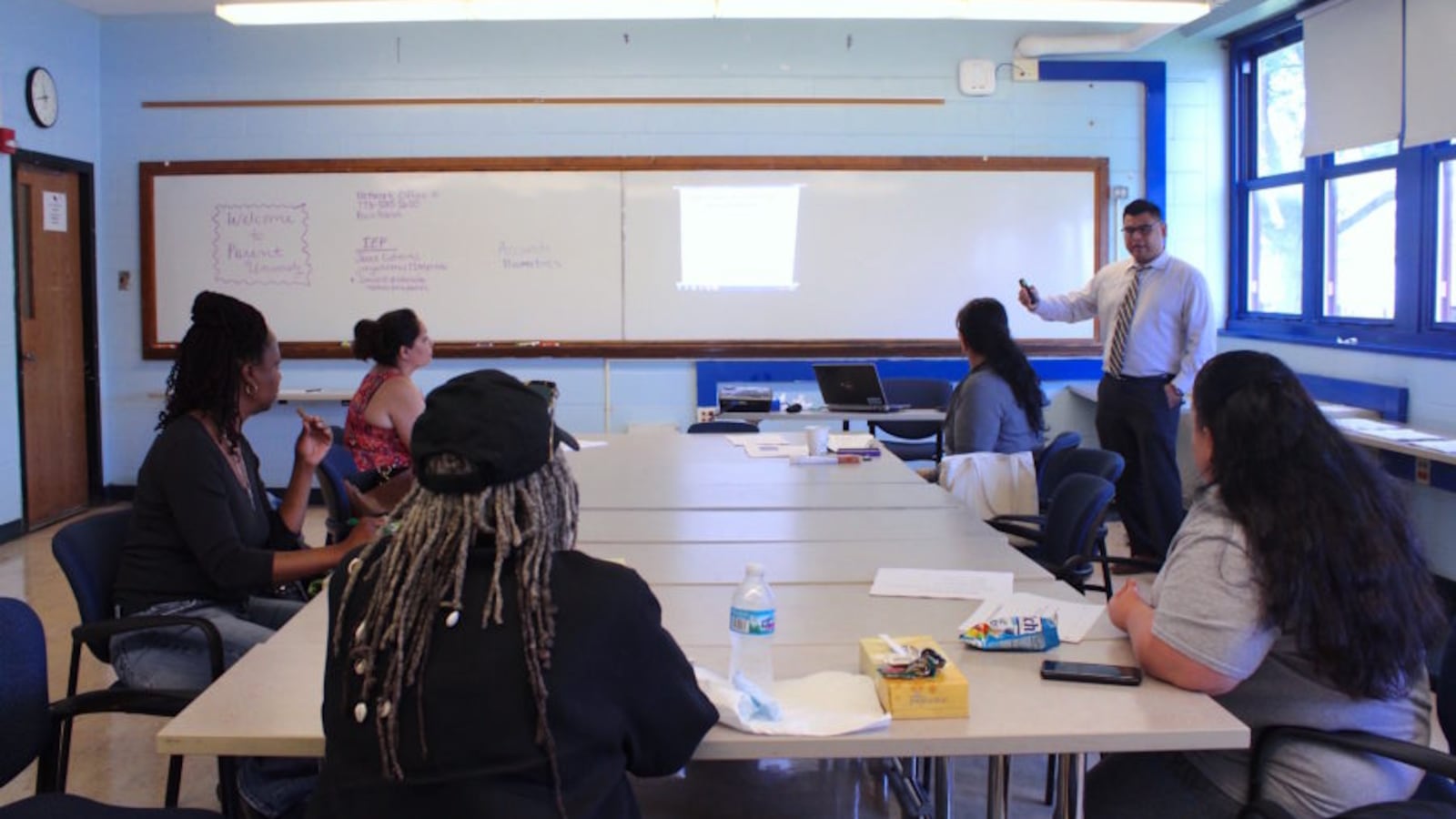In a classroom at Bogan High School Tuesday, trainer Jose Ortiz quizzed four Local School Council members on why they have to hold public meetings before approving their school improvement plan, a key document outlining school priorities and direction. The room fell silent.
“Because,” he answered himself, “the worst thing that the local school council could do is not consult the community.”
Ortiz’s training session illustrated the challenges that Chicago Public Schools faces in ensuring that all members of the powerful councils understand their roles and responsibilities.
The district requires those who help govern some 500-plus of its 646 schools each attend around 18 hours of in-person training, or nine online modules. But not everyone complies: Ortiz said that last week, around 10 people attended each module he taught, and on Tuesday, only four people sat through his class. Most council members take the training online, but the effectiveness of those modules is questionable, council members said.
In a district whose school board is appointed by the mayor instead of elected by city residents, the councils, as Ortiz pointed out, serve as important channels enabling residents to drive the direction of their children’s education. Normally consisting of 12 members, including the principal, teachers, parents, and community members, the councils hire and evaluate the principal, approve the budget, and help craft two-year school improvement plans for their schools.
Chicago schools have another problem with the councils: 47 percent of schools have failed to field enough candidates to fill seats, which then allows sitting council members to fill the vacancies. That means less electoral control for residents. It’s unclear if the training requirement deters people from seeking council seats.
Nevertheless, district officials said that this year they will enforce the training requirement and will contact members who fail to finish it.
“We are going to start removing people this year, but it will be after contacting them by email, through phone and then giving them an opportunity before we schedule a hearing, and then we will consider removing them,” said Guillermo Montes de Oca, director of the Office of Local School Council Relations.
As Ortiz continued with his training, he asked if members remember approving their school improvement plan in the past school year. The attendees looked at him with puzzled faces.
“Oh yes, I remember now,” said Andrea Sanchez, a council member at Richard J. Daley Elementary Academy. But, she added, “it’s just overwhelming because you’re looking at numbers and pages, especially when you’re not used to seeing it.” Sanchez has been a council member since December, but she had attended only one out of the nine mandatory training modules before Tuesday, because most of the two-hour sessions were held in various locations throughout the city far from her home.
According to the Illinois School Code, council members must finish all modules within six months of taking office, so newly elected members who take office on July 1 have until Dec. 31 to complete the modules. CPS has never removed a council member for not finishing the training, said Guillermo Montes de Oca. However, that’s changing.
This year, CPS has also been encouraging council members to finish the modules by July 31, he said, because “if you’re going to be seated, discussing the budget and everything, you need to be informed.”
Sanchez said she didn’t know know about the six-month deadline until Tuesday. She wishes the nine modules would be held all at once at her school. “The information in the modules should be given to us right away [upon joining the council],” she said.
Montes de Oca said that the Office of Local School Council Relations encourages council members to take the training online. Especially because the office only offers a few modules per month, to meet the July 31 deadline, council members would have to take most of their training online.
But the attendees Tuesday seemed to prefer the in-person trainings . Denishia Perkins, a council member at Shields Middle School for almost two years, said that she had taken all the training modules online, but they “didn’t do much for me.” The online training consists of clicking through slides of bullet-pointed information and then taking a short quiz at the end of each module.
“It’s so possible to get elected and not know about this stuff,” Perkins said. So she decided to attend the in-person training on Tuesday.
Sanchez said of Ortiz’s class, “It felt one-on-one, and he’s really explaining it to you.”
The trainings are not the only impediment to filling local school council seats.
A representative from the parent group Raise Your Hand told the Sun-Times that people may not want to run for a council position because “people are a little frustrated at the weakening of the local school council.” Currently, 50 percent of principals’ evaluations rely on CPS’ data and metrics, when previously the evaluations relied solely on the council members’ judgment.
Sanchez said that the work of councils are just not advertised enough, and many parents already are involved with jobs or other organizations.
“I don’t think the parents know that (Local School Councils are) that important,” Sanchez said. “I didn’t know either.”

